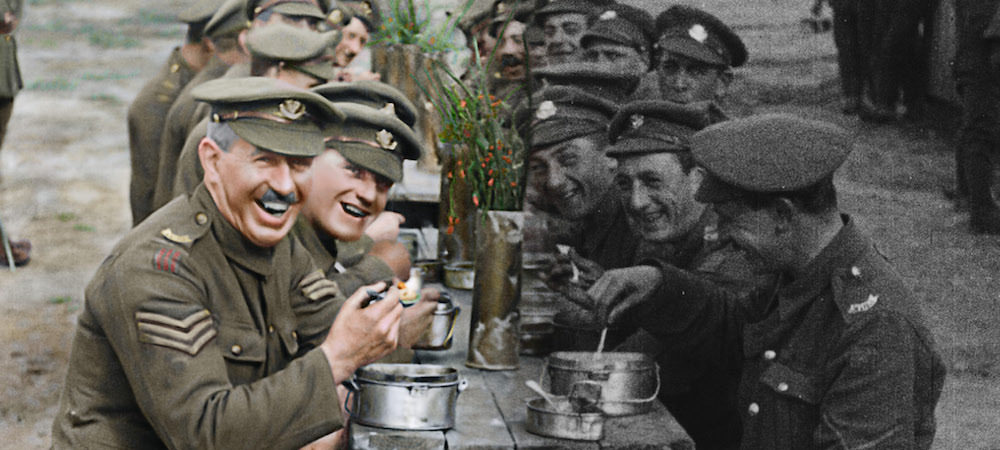Peter Jackson, a director best known for bringing the fantasy epic The Lord of the Rings to screen, demonstrates his mastery of technical know-how in his newest documentary, They Shall Not Grow Old.
This spectacular World War I documentary chronicles the experiences of British soldiers, ranging from their everyday lives to the horrors of trench warfare. They Shall Not Grow Old stands out from other documentaries, due to the filmmaker’s choice to only use original footage from the 1910s and interviews with the survivors recorded in the ’60s and ’70s. What makes They Shall Not Grow Old truly groundbreaking, however, is that Jackson and his crew digitally manipulate the original black-and-white footage to restore it, colorize it and convert it into 3D. They even went so far as to employ lip readers to find out what the soldiers were saying while being filmed. The result is a stunning insight into the lives of the British soldiers. It is fascinating and harrowing in equal measure.
To some people, however, it might seem jarring to see original footage thus manipulated. In effect, Jackson is taking artistic liberties to render the footage more cinematic for contemporary audiences. In the making-of documentary feature piece, Jackson says that his aim with these technical choices was to bring the viewer as close as he could into the immediacy of the soldiers’ lives in the trenches. Does he achieve this goal?
Boston University history professor Cathal J. Nolan said, “As a historian, I am supposed to oppose alteration of primary sources. But in this case, I do not. We now have the technology to get it mostly right and the process brings alive old black-and-white film for students. I have seen this in class, where you can show a real man dying in black-and-white and there is nearly no reaction. Seen in color, there is a strong one.”
Blake Wilson (CAS ’19) said, “I liked that they only had veterans of the war narrate it. The color scenes were incredible. It gave an accurate picture into the attitudes towards the war at the time and most people were not prepared for the brutality and savagery that the war had in store.”
They Shall Not Grow Old primarily depicts the lives of the British soldiers. Jackson thus sidelines the larger political and global conflicts. Nevertheless, instead of choosing a single protagonist or focusing on generals and politicians, Jackson shows how “The Great War” affected the lives of the common people and the people who fought, died and survived.
“Every soldier whose face they showed became the main protagonist in a sense,” says Connor Allen (CAS ’21). “There are so many iconic close-ups on these everyday guys. It’s like a shrine for everyone who was involved in the conflict.”
“I hope people’s interest in history and war is not limited to the personal and familial,” Nolan said. “But it is not actually possible to provide sufficient political and historical context in a film, even a documentary. Stimulate interest with a film that touches on the raw human element, and then hope people go to the harder job of learning about the war.”
Ultimately, Jackson tries to bring audiences closer to the lives of their ancestors and thus reconnect them with history. World War I ended almost exactly a century ago and the children of the veterans are slowly passing away. Rather than letting the memories and tragedies slip away from our cultural consciousness, They Shall Not Grow Old eloquently brings the history back into the present. While most of us would probably not sit down to watch a 90-minute long, silent black-and-white film about World War I, They Shall Not Grow Old invites you to share the experiences of the people who lived through it.
They Shall Not Grow Old is unlike anything you have ever seen before. I highly recommend you see it on the big screen and judge for yourself how effective the technical achievements are. It will most likely revolutionize the way that documentarians utilize black-and-white footage in the future. Remember to stay for the 30-minute long making-of documentary feature at the end.
They Shall Not Grow Old is currently playing at the AMC Loews in Boston Commons.
If you liked They Shall Not Grow Old, here are three additional movies I recommend:
- War Horse (2011, dir. Spielberg)
Following the perspective of a war horse in World War I, this movie explores the many different sides of conflict, preferring to humanize the different parties instead of throwing them into camps of good and evil. Being a Spielberg film, this is ultimately a heartwarming movie about the friendship between a boy and his horse, yet is in the larger story of a very dark chapter in history.
- All Quiet on the Western Front (1930, dir. Milestone)
This Academy Award-winning movie is an adaptation of the novel of the same name by a German World War I veteran. Similarly to They Shall Not Grow Old, All Quiet on the Western Front shows the experiences of the everyday German soldiers and the disillusionment they face when they confront the realities of the so-called “Great War.”
- Night and Fog (1955, dir. Resnais)
In the aftermath of World War II, director Alain Resnais radically forces contemporary audiences to confront their past and to not erase the Nazi concentration camps from their minds. Night and Fog is a shocking documentary that explores the place of history in modernity. It focuses on how people interact with the atrocities of the past and why it is so important to keep the memories alive.
A word of warning: Resnais purposefully uses original footage from Nazi concentration camps to make a deeply upsetting and emotionally disturbing movie.




